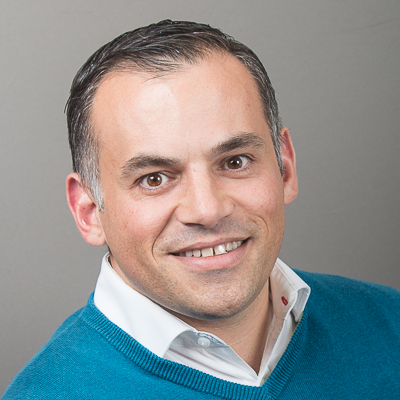How does one start out in science and research, become a lawyer, and ultimately remain connected to biomedical research? Redi Kasollja can explain because he has lived that journey. We reconnected with Redi who participated in the Forsyth Student Scholars (FSS) program in 2000. This year marks 30 years of the FSS program and Redi’s story is a perfect example of how research experience can have a variety of impacts on your career.
Q&A with Redi Kasollja
What is your hometown/neighborhood and which high school did you attend?
I came to the States in 1996 when my family immigrated from Albania. My first hometown was in the Roslindale section of Boston and I’m actually back in Roslindale now with my wife and three kids. I went to English High School in Jamaica Plain.
I learned about the program at Forsyth from someone in the school administration. At that time, I was really interested in pursuing an undergraduate degree focusing on pre-med because I had some family background in medicine from my father and my sister. I applied to FSS and was admitted for the summer of 2000.
Can you tell us about your experience at the Forsyth Summer Internship?
It was eye-opening in the sense that there was so much cool and cutting-edge research and science that was happening at Forsyth. My group of colleagues were assigned to different labs, and everyone had a different, but an equally rewarding, experience. It was meaningful and impactful as a scientific and learning experience as well.
Who did you work with and what projects did you work on?
I worked at Dr. Ernst Reichenberger’s lab, and his focus was on skeletal diseases. My research focus during my time in his lab was cherubism. During that project, we were doing a lot of research, trying to identify the genetic mutation that was causing the syndrome.
Cherubism is an inherited disease, which is reflected by excessive bone degradation of the jaw. The way that the protein works results in the jawbone being replaced by tissue. So, if you see folks with the syndrome, they have facial swelling, and they kind of look like cherubs depicted in many classical paintings in churches. So that’s why they call it cherubism.
What kind of impact did the FSS program have on your career path?
During college, I had a little bit of a tilt to my educational aspirations. I sort of went away from science a little bit and then started thinking about an education in law and a legal career. I finished undergrad at BU then went to law school, then went to private practice. But I always find myself being attracted to the pharma and healthcare work within my legal career because they are science driven fields. So, I really started to focus on just representing a lot of Life Sciences and pharmaceutical companies.
You never really know what impact an experience may have. Years have gone by, and I really do feel that the summer at Forsyth really made a lasting impression. It’s not surprising to me that even though it’s a legal career, I still have a focus on the research side of it.
After spending a few years at the law firm, in private practice, I moved to what’s called “in-house” so being a lawyer within a company as opposed to being an outside firm. I first worked with a cell and gene therapy manufacturing business within Thermo Fisher Scientific. There, I was supporting the business and advancing their cell and gene therapy assets. So, I worked a lot with many various stakeholders in the industry, including academic institutions, research organizations and biotech and pharmaceutical companies.
Then I moved to another company that is developing medications for neuromuscular diseases. In that role, I supported the company in advancing preclinical studies and then ultimately going into clinical trials. Now my current role at Apellis is similar in supporting the business to advance its development and commercialization of therapies in its pipeline, which is largely focused on opthalmology and rare diseases. So even from a legal perspective I’ve stayed close to research and development and, you know, ensuring that science gets advanced to make an impact for those who need it.
Where do you aspire your work to be in five years?
In five years, I see myself remaining very closely tied to the pharmaceutical and life sciences industry, with a goal of supporting research and science from a legal perspective to advance the goal of making an impact for patients. So, whatever those therapeutic areas may be, that’s what I’m passionate about. Even though I may not be doing bench work or am not closely tied to designing and identifying assets, I’m still supporting the business of science and research.
Do you have any advice for high school students considering STEM education tracks?
When you’re younger and trying to consider careers, you’ll never go wrong pursuing a degree in science. You’ll never go wrong pursuing research. Especially in this area where we are, it’s amazing to have so many opportunities in the ecosystem here in Boston, Cambridge. There’s so much research happening, so many brilliant people that even if you tend to shift your career later on to something else, whether it be business, legal, whatever, you know, I think that focus on science and research will always take you far.

